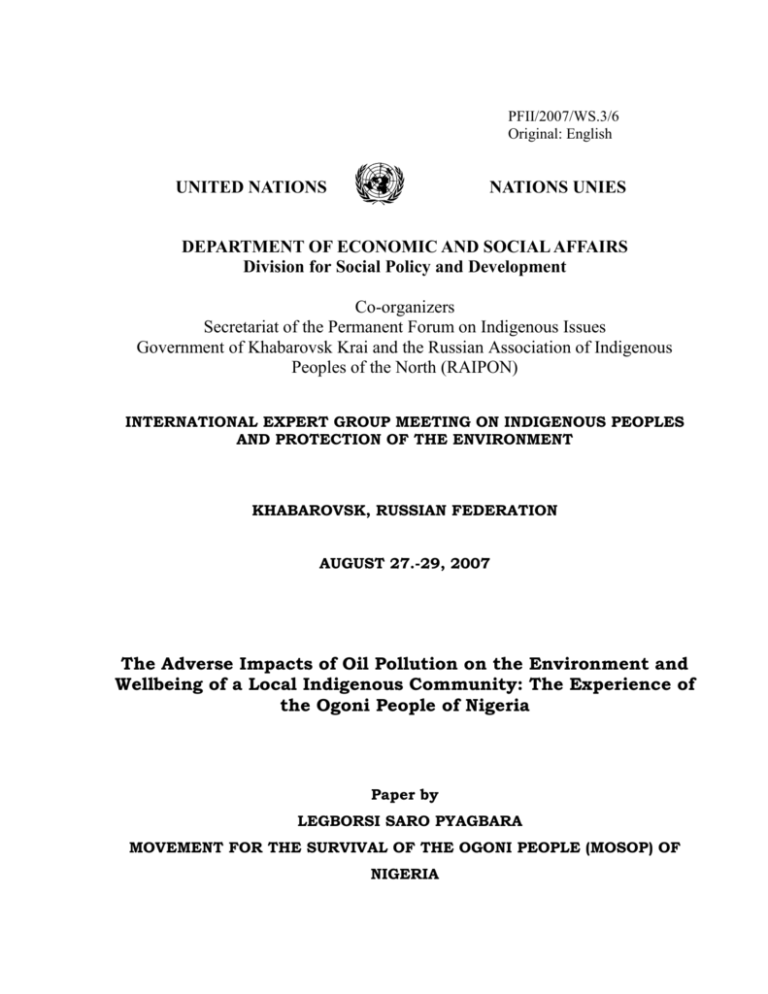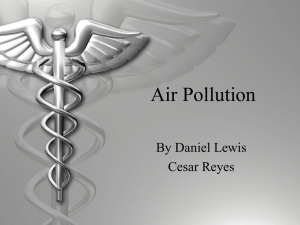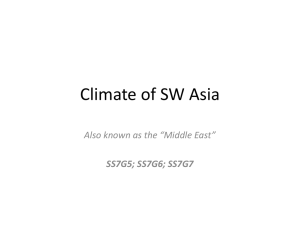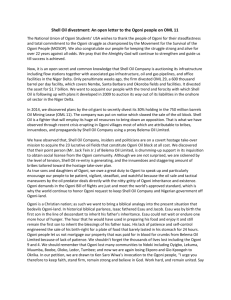The Effects of Oil - the United Nations
advertisement

PFII/2007/WS.3/6 Original: English UNITED NATIONS NATIONS UNIES DEPARTMENT OF ECONOMIC AND SOCIAL AFFAIRS Division for Social Policy and Development Co-organizers Secretariat of the Permanent Forum on Indigenous Issues Government of Khabarovsk Krai and the Russian Association of Indigenous Peoples of the North (RAIPON) INTERNATIONAL EXPERT GROUP MEETING ON INDIGENOUS PEOPLES AND PROTECTION OF THE ENVIRONMENT KHABAROVSK, RUSSIAN FEDERATION AUGUST 27.-29, 2007 The Adverse Impacts of Oil Pollution on the Environment and Wellbeing of a Local Indigenous Community: The Experience of the Ogoni People of Nigeria Paper by LEGBORSI SARO PYAGBARA MOVEMENT FOR THE SURVIVAL OF THE OGONI PEOPLE (MOSOP) OF NIGERIA Introduction Crude oil has had profound impact on the world civilization than any single natural resource in recorded history. Oil has become a very decisive element in defining the politics, rhetoric and diplomacy of states. This fact is adumbrated in a public lecture entitled “Oil in World Politics” delivered by a former secretary of the Organization of the Petroleum Exporting Countries (OPEC), the late Chief M.O.Feyide, when he asserted that “All over the world, the lives of people are affected and the destiny of nations are determined by the result of oil explorations. Oil keeps the factors of the industrialized countries working and provides the revenues, which enable oil exporters to execute ambitious national and economic development plans. The march of progress would be retarded and life itself would be unbearable if the world is deprived of oil. That is why oil has become the concern of governments, a vital ingredient of their politics and a crucial factor in the political and diplomatic strategies”i Yet behind this deification of oil, nothing is said about its impact on the environment. Nigeria joined the league of oil producing nations on August 3rd, 1956 when oil was discovered in commercial quantitiesii and today ranks as the leading oil and gas producer in Africa and the 6th largest oil exporter in the world. Nigeria is also Africa’s most populous nation with 140 million peoples as announced for the recently conducted National Census in 2006. As oil was struck in commercial quantities in Nigeria, it also signaled the beginning of a profound transformation of Nigeria’s political and economic landscape. Since the 1970s, oil has accounted for 80% of the Nigerian government’s revenue and 95% of the country’s export earnings. Interestingly, all of Nigeria’s oil and gas resources come from its Niger delta region occupied by a mosaic of indigenous nationalities. The Niger delta sustains the largest wetland in Africa and one of the largest wetlands in the worldiii The Niger delta consists of a total landmass of approximately 70,000 square kilometers with the third largest mangrove forest in the world, a most extensive fresh water swamp, coastal 2 ridges, fertile dry land forest and tropical rainforest characterized by great biological diversity. Seasonal flooding and sediment deposits over thousands of years have made the land fertile. The immeasurable creeks and streams have in the past, provided habitat for an abundance of fish and marine wildlife. Today the Niger delta is home to approximately 20 million people grouped into several distinct nations and ethnic groups, amongst which is the Ogoni. Background The Ogoni people are a distinct indigenous minority nationality living in an area of 404 square miles (about 100,000 square kilometers) on the south eastern fringe of the Niger Delta River in what is geo-politically referred today as the South-South of Nigeria. The Ogoni people number around 750,000 based on the last census and has a population density of 1250, one of the very highest in any rural setting of the world and compares favourably with the Nigeria national average of 250iv. As an indigenous people, the Ogoni had a well established social system that placed great value on the environment before the advent of British colonial rule. Living on a fertile alluvial soil and blessed with a necklace of rivers and creeks, the Ogoni people seized the opportunity of having these resources to become great fisher folks and farmers, producing not only for their own subsistence but also for their neighbours in the Niger Delta and was appropriately referred to as the ‘Food basket of the Niger Delta’. They created a system of agriculture; their traditional means of livelihood ensured the sustainable management and sustainable exploitation of natural resources. Socio-culturally, the Ogoni people live in closely knit communities and are more endogenous. The Ogoni people have a tradition and custom that is deeply rooted in nature and this helped them to protect and preserve the environment for generations. The land on which they live and the rivers which surround them are viewed by them not just as natural resources for exploitation but with deep spiritual significance. “Land is viewed as the abode of our ancestors from where they oversee our lives, it is also a god and we revere it as suchv. 3 This respect and reverence for land also means that forests are not merely a collection of trees and the abode of animals but also, and more intrinsically, a sacred possession. Therefore, trees in the forests cannot be cut indiscriminately without regard to their sacrosanctity and their influence on the wellbeing of the entire community. There are some animals that you cannot kill because they are said to be totems. That is, they are supposed to be animations of the spirit of somebody and if you kill them, then something disastrous will happen. Similarly, rivers and streams apart from their being the source of water for life are also intricately bound up with the life of the community and are not to be desecrated through oil pollution etc. Thus; our people believe that there is a dynamic interaction that exists between men and women, animal, plants and so on. These were the natural rights that our people understood over the years and there is a belief in the system that every person has to take action to protect those natural rights. Rights to lands, rights to nature etc. Grave consequences follow any erring human conduct or action desecrating the environment and failure by the custodian community to take action to protect it from desecration attracts the wrath of the gods, which visits the community with disaster. The pre-colonial social system therefore ensured sustainable exploitation of natural resource and protection of biodiversity. Most of these practices still exist to this day and this explains why the Ogoni people are unanimous when it comes to taking decisions that borders on their environment. To them, their lives are intrinsically bound with the survival of the environment. This also explains why the Movement for the Survival of the Ogoni People (MOSOP) recorded a phenomenal success in mobilizing the Ogoni People to stand up against the denigration of their environment in the early 1990s. Oil Discovery, Oil Pollution and Ogoni Oil was discovered in the Ogoni territory in early 1957 when Shell found oil in the Ogoni community of K-Dere popularly and misnomerly called the Bomu Oil fieldsvi. Subsequently, Shell made more discoveries in other Ogoni communities including Ebubu, Yorla, Bodo West 4 and Korokoro. Shell Petroleum Development Company is the sole player in the oil extractive industry in Ogoni having secured the Oil Mining License (OML) covering the entire Ogoniland. At the last count, Ogoni has five major oil fields with 110 oil wells, hooked up to five flow stations at Bomu, Korokoro, Yorla, Bodo West and Ebubu by a necklace of interconnecting pipelines which criss-crossed Ogoni villages. Gas had been flared for 24 hours a day for 40 years in close proximity to human habitation in nineteen oil locations in a 404 square mile area with population density of 1250 per square mile. This have been done without due regard to the negative impacts of such activities on the people and the environment. Until now, no EIA study in Ogoni has been done. Unfortunately, the history of oil exploitation in Ogoni is like the history of oil pollution as the commencement of oil exploration and exploitation was followed almost immediately with the three major causes of oil pollution namely, the impact of the seismic survey, gas flaring and oil spills. What is Pollution? The word pollution have various meanings. However, under Nigerian law, Section 41 of the Federal Environmental Protection Agency Act Cap.F10 Laws of the Federation 2002, defines ‘pollution’ to mean: “Man-made or man aided alterations of chemical, physical or biological quality of the environment to the extent that is detrimental to that environment or beyond acceptable limits.”vii In the specific case of oil pollution, it could be said that oil pollution occurs when the above happens as a result of, or in the course of the extraction, storage or transportation of petroleum oil. It can be seen as the release of contaminants or pollutants associated with the extraction of crude oil into the environment. Sources of Oil Pollution. In Ogoni, three main sources of oil pollution have been identified. These are; 5 1. Oil spills 2. Gas Flares 3. Effluent and waste discharges. Oil spills Occurrences In Ogoni, between 1993 and mid- 2007, there has been a recorded 35 incidences of oil spills. This is aside from the unnoticed slicks and unreported cases of oil spills. The major causes of the spill incidences in Ogoni include Pipelines and flow lines leakage/blowouts, blowouts from well-heads due to poor maintenance and damage and spills from flowstations. As has been stated earlier, oil spills involve the release of dangerous hydrocarbons such as benzene and Polynuclear Aromatic Hydrocarbons into the soil and water sources. These spillages affect vast stretches of land and waterways thus polluting not only crops but also marine life and the sources of water for domestic uses. Mangrove forests are particularly vulnerable to oil spills because the soils soak up the oil like sponges and re-release it every rainy season. In other cases, the oil prevents the lenticels of the mangrove to absorb oxygen hence oxygen starvation results. The mangrove withers and dies in large numbers due to spill. As the spill occurs, it spreads onto farmlands and waterbodies. The toxic crude seeps into the grounds and is taken up by the roots of plants. Recent studies have shown that oil spills lower soil fertility and cause poor growth of plants. Gas Flares Oil production involves the burning of hydrocarbon gases. The flaring–off of natural or associated gas is done as a by-product of the drilling of crude oil from reservoirs in which oil and gas are mixed. One hundred percent of the gases were being flared, resulting in pollution of the area. This made the Ogoni area one of the most polluted areas in the world. In the Ogoni 6 area, the impact of gas flares on the local ecology and climate as well as peoples’ health and property is evident. The flares involve the release of dangerous hydrocarbon mostly methane and others which include sulphurous oxides and the oxides of Nitrogen into the atmosphere. The flares raise the temperature of the surrounding environment to temperatures beyond normal of 13-14,000 degrees Celsius and causing noise pollution around the vicinity of the flares. The result of this unchecked emission of gases is the release of 35 million tons of Carbon dioxide and 12 million tons of methane which means that the Nigerian oilfields contribute more to global warming than the rest of the world put togetherviii. Another problem associated with gas flaring is Light Pollution. Light pollution subjects the living organism around the vicinity of the flare to 24-hour daylight. This affects diurnality and night-time patterns in animals. The flares drive away games, it affects the reproduction of fish as well as sending fish to deep sea areas. The gases released during gas-flaring, mixes with the moisture and other forms of precipitation in the atmosphere to form acid rain. Effluent and Waste discharges. Another source of oil related pollution is the discharge of effluents into the surrounding environment, sometimes into the water, by the oil companies. For instance, during exploration or seismic surveys by oil companies, drill cuttings, drilling mud and fluids are used for stimulating production. There is also the use of chemicals during seismic activities. The major constituents of drill cuttings such as baryotes and bentonitic clays when dumped on the ground prevent local plant growth until natural processes develop new topsoil. In the water, these materials are dispersed and sink and may kill local bottom living plants and animals by burying themix. In addition to the pollutants introduced into the environment from exploration and exploitation operations, refinery wastes also have characteristics which 7 constitute potential land, water and air pollutants. The disposal of wastes into the sea from oil facilities has direct effects on fish stocks. The Impacts of Oil Pollution on the Environment and Wellbeing of the Ogoni People. Oil pollution has impacted on the Ogoni community in several ways. These are grouped into three interrelated impacts viz.; 1. Adverse impacts on Biodiversity 2. Socio-Economic Impacts 3. Physico-health impacts 1. The Impact on Ogoni Biodiversity The most profound and adverse impact of oil pollution in Ogoni with far-reaching implications on all other aspects of our traditional lifestyles and livelihoods, had been the total loss of biodiversity and destruction of habitats largely due to soil degradation. The results of the unchecked oil pollution in Ogoni have been the complete destruction of ecosystems. Mangrove forests have fallen to the toxicity of oil spills and are being replaced by noxious nypa palms, the rainforest has fallen to the axe of oil companies, wild-life and game have been driven away and farmlands have been rendered infertile with gross implication on the right to adequate food. During oil spills, the process of photosynthesis which enhances plant diversity is impaired since the process is reduced due to the fact that spilled crude have a high absorbance property so when the crude spreads on to the surface of leaves, the latter find it difficult to photosynthesize and thus die, leading to biodiversity loss. The toxic crude also affects underground herbs and shrubs, while microbial organisms which form important groups in the food web, are also destroyed. 2. Socio-economic Impacts These adverse impacts include: 8 I. Nutritional styles and Food Shortage One fallout of oil pollution in the Ogoni area is the destruction of the traditional local economic support system of fishing and farming. The combination of the effects of oil spill and acid rain resulting from gas flaring has been soil degradation which affects crop yield and harvest. Fish are driven away from in-shore or shallow waters into deep-sea as a result of flaring. The ultimate result of this is the poor crop yield as the soil has been rendered infertile and poor fish catch, as most fish has been driven into deep waters and the Ogoni people do not have the fishing gadgets to go into deep-sea fishing. The whole impact of this, is food shortage and which has affected the ability of most families to feed themselves. As a result of the above, Ogoni that was once the food basket of the Niger Delta, is now fully dependent on imported food such as the popular icefish which has now replaced the traditional fish in our menu table. Thus, oil pollution has impacted on the right to food of the Ogoni people. The African Commission (Decision 155/96, para 66 involving The Social and Economic Rights Action Center and the Center for Economic and Social Rights versus the Federal Republic of Nigeria) stated, amongst others that the government's treatment of the Ogoni has violated all three minimum duties of the right to food by allowing private oil companies to destroy food sources thereby falling short of what is expected, under the provisions of the African Charter and international human rights standards, and hence, is in violation of the right to food of the Ogonix. II. Destruction of Traditional Means of Livelihood 9 Another implication of oil pollution is that having destroyed biodiversity, it has also rendered the agricultural sector, which is the largest employer of labour in Ogoni, unprofitable. Hence, most of the youth and women have become jobless since their local economic support system of fishing and farming is no longer sustainable. An example is the case of the mangrove abundant Ogoni community of Bodo where the livelihood of the local people have been sustained by living in the midst of a once healthy and productive mangrove forest by fishing and farming. They also gathered mangrove wood for building and for local energy and fuel. However, due to being subjected to incessant oil spill incidences, oil have coated the breathing roots of this plant killing off parts of the mangrove forest and animals and marine life that depend on it. This mangrove forest which serves as habitats for fish and mollusks as well as a source of raw materials for communities in Ogoni have been lost to the ravages of oil pollution. The land, the sea and the environment can no longer support the subsistence life that this local Ogoni community, which they have been dependent upon for thousands of years. III. Migration and the Rise of Environmental Refugees Socio-culturally, the Ogoni people live in closely knit communities and are more endogenous. The Ogoni people were not used to mass outflows/movement from their territory as their subsistent economy provided them with their basic needs. To the average Ogoni, movement from the area, which was considered a place of abundance into alien lands, means subservience, poverty in the new area, and loss of pride and self-esteem. This indeed, was the situation before economic consideration led to the development intervention of oil exploration and exploitation by Shell Petroleum Development Company (SPDC), which resulted in a complete change in the socio-economic landscape of Ogoni. Oil pollution has resulted in the destruction of the Ogoni environment. This in turn has led to the unsustainability of land for the traditional economic livelihood patterns that once thrived in the area. As a result, there are many Ogoni women and youth emigrating out of the area into cities especially to Port Harcourt where they have become environmental refugeesxi and because of their poor economic status, have had to take up accommodation in shanties, slums and 10 waterfronts with its attendant risks especially in terms of rights protection. In recent times, these slums have been facing demolitions by government. IV. The Impact on Cultural Values and Spirituality Oil spills and Gas flares knows no boundaries so there are adverse impacts on cultural values and social harmony. One of the most telling impacts of oil pollution on the Ogoni community is that it has led to the death and possible extinction of medicinal plants and herbs that are rooted in our traditional medicine and spirituality and have deep spiritual significance to the community. This degradation is brought about by the fact that most of these herbs and plants are found in sacred grooves, shrines and forests, which have fallen under direct destruction in the course of oil exploitation and the toxicity of oil pollution. An interesting point to note in this regard is that under Nigerian law, a licensee of an oil mining lease is precluded from exercising its mining lease where, inter alia, the land is a sacred forestxii But this is routinely flouted with impunity by the rampaging oil companies. V. Impact on Traditional Institutions of Authority and Social Harmony One area in which oil pollution has dealt a dead knell to our customs and traditions is the rugged individualism which it has fostered amongst members of our communities which is contrary to our communal lifestyles. This had led to the disintegration of customs, traditions and social values, such as respect for our elders. By the Ogoni tradition, elders are given the traditional authority to be custodians of the community and its protectors in times of stress and inconvenience such as during oil spills and other environmental incidents. The traditional system ensures that no single individual have the right to take what belongs to the community for him or herself. However with the arrival of the oil companies, a new level of relationship is created between the oil companies and the elders led by the traditional rulers who most times now see their community people as subjects and them as big men because of the largesse and special treatment that are given to them (individuals rather than the communities) by the oil companies thus alienating them from the people. 11 The result is that in times of distress or oil pollution like oil spills and fire conflagrations, most of these elders think of themselves first and collect monies and others from the oil companies or they will form companies in order to front them for contracts to do the “clean up exercises” which are actually euphemisms for “cover ups”. Rather than being the supposed protectors of the people, most elders are being seen as collaborators with the oil companies thereby eroding community respect for their status and subsequent conflict between them and the youth. In this way, the social harmony that once existed is broken and discord ensues. 3 .Physico-health Impacts of oil Pollution I. Destruction of Zinc Roof One of the increasing socio-economic costs to most Ogoni communities resulting from oil pollution, is the rapidity of which zinc roofs are easily corroded. Houses with zinc roofs that are close to the location of the flare stacks do not last for two years before they become corroded. This is different from other areas where zinc roofs last for at least ten years. This is a common trend that is also observed in other parts of the Niger Delta where oil extraction is presently taking place xiii This zinc corrosion has added another dimension to the increasing socio-economic costs to the burden of the Ogoni people. It is a common knowledge that acid rain oxidizes zinc through the process of oxidation to form zinc oxides. This oxidation process is responsible for the corrosion. This has led Ogoni homeowners to resort to purchase of the expensive asbestos with its obvious potential health hazards. II. The Effects of Oil Pollution on Health The most worrisome aspect of oil pollution in Ogoni is the rise in occurrence of certain ailments that were previously unknown in the area. It has been reported that there is correlation between exposure to oil pollution and the development of health problems xiv. In a recent research report released by a group of scientists from the Faculty of Pharmacy, University of Lagos, it was 12 found that water samples collected from the sea, river, bore holes, lagoons, beach and so on from the Niger Delta region – especially in Delta and River States, indicates that more than 70% of the water in the Niger Delta contains a chemical called Benzo () pyrene, with a high concentration of 0.54 to 4ug per litre, far above the World Health Organisation (WHO) recommendation of 0.7ug/1 for drinking waterxv. The report further asserted that if the level of the harmful chemicals could be this high in ordinary water, the sediments which fish and other aquatic creatures feed on are definitely higher in Benzo () pyrene concentration, and the people dependent on these marine creatures for food, automatically take in much more higher level of the cancerous chemical. This report is consistent with the experience that we have had amongst our people in the past thirty years who had lived to see an increase in the occurrence of cancer and other respiratory problems traceable to oil pollution in the area. The diseases include respiratory problems, skin ailments such as rash and dermatitis, eye problems, gastro-intestinal disorders, water borne diseases and nutritional problems associated with poor diet. III. Effect on Underground Water A serious threat posed by oil related pollution is the impact on underground waters. When oil spills or when there is an effluent discharge or acid rain, it seeps into the ground and becomes mixed in the underground water system. It has been found that polluted underground water take many years before it can be remedied. Yet this underground water moves into streams and wells which are the only sources of local water supply in the community which results in the rise of water borne diseases. This has affected the traditional relationship of our people with water. There is a palpable fear that rather than being the source of life, these water systems have become sources of misery, disease and death. CONCLUSION It could be seen from the above that the externalities of oil extraction have resulted in profound adverse impacts on traditional lifestyles and livelihood patterns in the Ogoni community where unchecked oil exploration and exploitation had taken place for the past forty years. 13 The oil companies has not in anyway helped matters as they continue to flout environmental regulations in their areas of operations and pay less attention to environmental protection regimes that would have helped to abate oil pollution. The government on its part has not shown any commitment to enforcing the minimal environmental laws which it created. A case in point is the government regulation which forbids the exploitation of oil in sacred lands yet this is routinely flouted without any government intervention on behalf of the community. It is our measured opinion that to abate these adverse effects which oil pollution have had on the Ogoni Community, the oil companies and the government should show more commitment to the use of abatement procedures and environmentally sound and cleaner technologies for oil exploration and exploitation. RECOMMENDATIONS. (1) All draconian laws concerning oil, gas and land-use that exclude indigenous peoples from participation in the control and use of their resources be abrogated or amended. The 1978 land use Act and the 1969 Petroleum Act (in Nigeria) should be repealed immediately as recommended by the Committee on the Elimination of Racial Discrimination (CERD). The government should take urgent steps to restore the right of communities to some measure of control over their resources. (2) A multi-stakeholder approach to oil exploration and exploitation should be put in place involving the triad of government, oil companies and host communities. The multistakeholder mechanism should address issues of biodiversity conservation and regeneration. (3) Oil and gas matters which are currently put on the exclusive legislative list should be removed and put on concurrent list to enhance partnership and collaborative decision making involving the oil companies, government and host communities. This will provide more choices for the people. (4) The government of Nigeria should muster the political will to exact stricter respect for environmental laws and regulations by oil companies and a penalty plan established that require oil companies whose activities cause excessive pollution or are ill–equipped, to forfeit their licenses. 14 (5) Oil companies should be made to pay greater respect to the implementation of judicial pronouncements on their activities. A case in point is the recent judgment by a Federal High Court in Nigeria that all oil companies in Nigeria should stop gas flaring. (6) An insurance fund against oil pollution be established by the government and the oil companies. In this fund, all the socio-economic costs resulting from oil pollution, can be charged and insured against. (7) A rapid oil spill response mechanism be put in place by the government and oil companies which must be committed to responding to communities in distress due to oil spills (8) The government should require oil companies to provide all the necessary social infrastructures before the commencement of oil exploitation so that their operations will not impact negatively on the immediate local population. (9) The current compensation regime in Nigeria has to be reviewed for it to be fair and adequate to meet the emergency needs and concerns of those affected by pollution. (10) The water situation in Goony and the Niger Delta should be declared a national emergency requiring massive investment in the provision of alternative water supplies. (11) As required by Article 8f of the Convention on Biological Diversity, the government and Shell Petroleum Development Corporation should embark on the massive rehabilitation and restoration of the degraded Ogoni ecosystem and promote the recovery of threatened species. To this end, the Nigerian government, as a signatory to the Convention, should keep to its obligation under the Convention by embarking on an environmental audit of Ogoniland as recommended by the Secretary-General’s Fact Finding team to Ogoni in 1996. (12) Multilateral donors and other development actors should design an operational policy guideline which could provide the basis for assisting Nigeria and other countries, to integrate environmental concerns and indigenous rights in their national development policies. Endnotes i Chief M.O.Feyide: Oil in World Politics: Proceedings of 1986 Public lecture at University of Lagos Dr.Goodluck, E.Jonathan: 2004: Niger Delta: Challenge of Sustainable Development p28 iii Human Right Watch: “The Price of Oil”;1999; p53 iv Ken Saro Wiwa:1993:Second Letter to Ogoni Youth pg 14 v Extractive Industries and ESCR – a publication of Institute of Human Rights and Humanitarian Law 2000 vi Legborsi Saro Pyagbara:2005:The Impact of Oilspills on Biological Diversity-The Ogoni Experience vii Section 41 of the Federal Environmental Protection Agency Act Cap.F10 Laws of the Federation 2002 ii 15 Extractive Industries and ESCR – a publication of Institute of Human Rights and Humanitarian Law 2000 pg 43-44 ix Oil of Poverty in the Niger Delta :2004:A publication by African Network for Environmental and Economic Justice x Judgment of the African Commission on Communication 155/96 para 66. www.cesr.org/nigeria xi Legborsi Saro Pyagbara:2004:Minority Rights, Development and Migration-The Case of the Ogoni People xii Paragraph 17 of the Petroleum ( Drilling and Production) Regulations Cap P10 Laws of the Federation 2002 xiii Report of the Essential Action Team to the Niger Delta in September, 1999. The Report can be assessed on www.essentialaction.org/shell/report xiv O.S.Olusi: Nigerian Oil Industry and the Environment: Proceedings of the 1981 International Seminar(Lagos,Nigeria:NNPC,1981) xv Nigerian Quarterly Journal of Hospital Medicine” Vol. 14 July–December, 2004. viii 16









